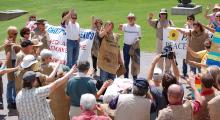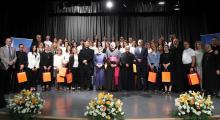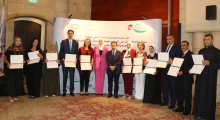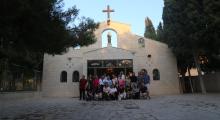Issued by the Catholic Center for Studies and Media - Jordan. Editor-in-chief Fr. Rif'at Bader - موقع أبونا abouna.org
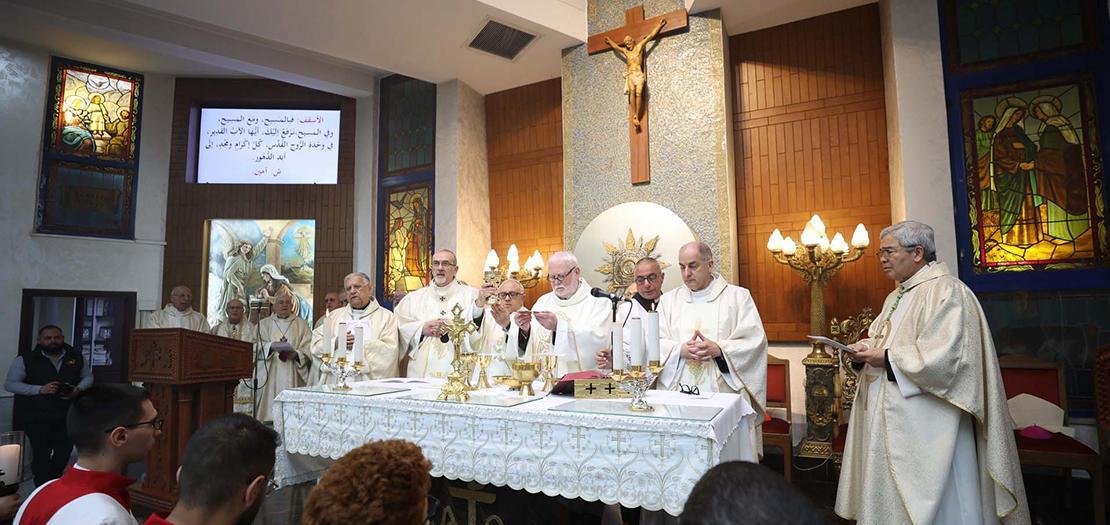
Following is the text of the homily delivered by Archbishop Paul Richard Gallagher, Holy See’s Secretary for Relations with States and International Organizations, during the Holy Mass he celebrated at St. Mary of Nazareth Church in Amman on Monday, March 11 which was concelebrated by the heads of the Catholic Churches in the Holy Land:
Dear Brothers and Sisters,
I warmly greet all the members of the Assembly of the Ordinaries of the Holy Land gathered here in Amman, and the Latin Patriarch of Jerusalem, His Beatitude Cardinal Pierbattista Pizzaballa, and I thank you for your warm welcome.
I extend the greetings and blessings of His Holiness Pope Francis to all of you present – Latin, Melkite, Syriac, Maronite and Chaldean – priests, religious and faithful, as well as to your families and communities, especially the Christian refugees from Palestine, Iraq and Syria.
I have come to visit the Hashemite Kingdom of Jordan because, 30 years ago, Pope St. John Paul II and King Hussein Ibn Talal decided to establish diplomatic relations to strengthen the long-standing relationship of respect and friendship that had already existed between the Holy See and Jordan.
For the Holy See, diplomatic relations are an ancient and well-established practice. They serve as an instrument to support the freedom of the Catholic Church in the country ("libertas Ecclesiae") and the defence and promotion of human dignity ("dignitatis humanae"), based on the values of justice, truth, freedom and love.
These principles have always characterized our friendly relations with Jordan. In this country, the Catholic Church is both fervent and active, and it can engage in pastoral activity in a free and fruitful fashion, providing especially important ministry to young people.
As you know, young people need a vibrant Church now more than ever. They need pastors and catechists who know how to bring out the beauty of the faith in the Risen Christ, who came to serve, not to be served. Let us never tire of proclaiming and living the Gospel in order to foster our authentic Christian identity, whether it be in parishes, in Catholic schools – that the Jordanian society values so highly – or in the Holy Places.
And what does it mean to be Christian? “I raise my eyes toward the mountains. From where will my help come?” asks the Psalm that we have just heard. Let us look to the Mount from which Jesus helps us to understand the identity of the Christian. The Beatitudes outline a way of "being" which, as a consequence, becomes a way of "doing". They enrich and complete the values contained within the Ten Commandments, providing us with a clear direction for our lives.
The Beatitudes, however, present us with an almost paradoxical situation: it is precisely those who suffer the most who are called blessed. Jesus proclaims that the poor, the hungry, the thirsty, the persecuted, the dishonored and the meek are blessed: the world's criteria are turned upside down to show what God's perspective is.
Yes, the Beatitudes demand 'conversion'. Etymologically, the word conversion means to “turn away”. It implies an interior turning away from the direction we would spontaneously take. But this conversion brings to light what is pure, what is higher. Our existence become re-ordered in the proper way. Through conversion, we are presented with a “new man”, a program of life that leads to a different kind of happiness. Such a happiness is not based on fleeting feelings, but on the profound joy of being with Christ and in Christ, at the service of the Kingdom of God.
The Beatitudes tell us that a Christian should be a meek person who is not ashamed to weep, who has a pure and gracious heart capable of forgiveness, who is always in need of God, who seeks the "authentic food and water" of justice, who is a lover and promoter of peace, and who is not afraid of persecution for the sake of the Gospel.
All these qualities that should characterize the disciple are also a portrait of Christ. A few miles from here, on the banks of the Jordan, the heavens opened and the Spirit of God descended like a dove on Jesus, and a voice from heaven said: "This is my beloved Son, in whom I am well pleased" (Matthew 3:17). The more we meditate on the Beatitudes, the more we recognize the identity of the Beloved of the Father, the Savior, Jesus Christ.
Dear brothers and sisters, you bear witness to the fact that to be "less" numerous than the vast majority is not to be "less" Christian. Quite the opposite! If we are few in number, it means that we need to show ever more authentically and consistently that we are not afraid to live the Gospel. None of us is perfect or immaculate. Nevertheless, we are a group of people who, in spite of sin, are ready to give our lives for Christ, according to the vocation we have received.
Be courageous! Always have hope! I extend this invitation to all the Churches throughout the entire Middle East. You are aware that in some countries Christians cannot pray in their own language, in others they cannot build churches, in others they do not have the freedom to participate in political and social life, in others they experience real and violent persecution. In spite of this, Jesus consoles us saying “Rejoice and be glad, for great is your reward in heaven” (Matthew 5:12a). We must be in solidarity with their suffering. Let us continue to work tirelessly for their free adherence to Christ and pray for them.
I can assure you that Pope Francis has a special concern for the entire Middle East. He follows with great attention what is happening in Israel and Palestine and, as you well know, he is in constant contact with the Catholic community in Gaza.
The day after tomorrow, the 13th of March, will be the 11th anniversary of his election as Pope, and I invite you to join me in remembering him in a special way during this Holy Mass. May the Lord keep him in good health, protect him and give him strength.
The Lord Jesus established Peter and his successors as the rock upon which he would build his Church. Through this primacy, the Pope is the visible principle of Christian unity. Let us rejoice, in faithful obedience, in this communion that exists between Rome and all Catholics spread throughout the world. The rich variety of ecclesiastical disciplines, liturgical rites, and theological and spiritual heritages proper to the local Churches, "unified in a common effort, shows all the more resplendently the catholicity of the undivided Church."(LG 23)
Today, more than ever, we feel this great unity in the prayer that brings us all together, the whole Catholic Church scattered throughout the world: the prayer for peace!
Pope Francis, together with the whole Church, prays that in Israel and Palestine, and throughout the region, weapons will cease to fire, that people will no longer be killed, that hostages will be released, that the wounded will be helped and that aid will reach those who are in need.
Ten years ago, here in Amman, Pope Francis said: Let us ask the Holy Spirit to prepare our hearts to encounter our brothers and sisters, so that we may overcome our differences rooted in political thinking, language, culture and religion. Let us ask him to anoint our whole being with the oil of his mercy, which heals the injuries caused by mistakes, misunderstandings and disputes. And let us ask him for the grace to send us forth, in humility and meekness, along the demanding but enriching path of seeking peace.
Amen.


